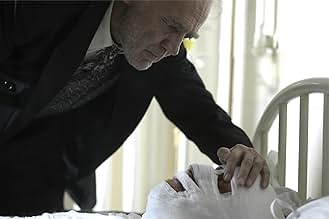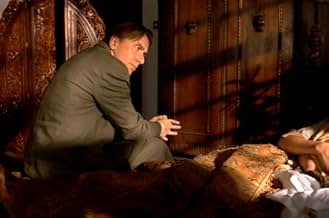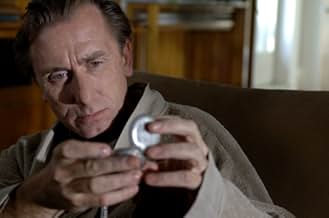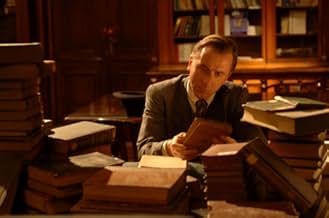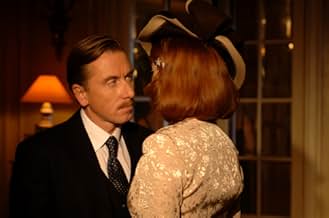IMDb रेटिंग
6.1/10
15 हज़ार
आपकी रेटिंग
अपनी भाषा में प्लॉट जोड़ेंA love story wrapped in a mystery. Set in World War II Europe, a professor is changed by a cataclysmic event and explores the mysteries of life.A love story wrapped in a mystery. Set in World War II Europe, a professor is changed by a cataclysmic event and explores the mysteries of life.A love story wrapped in a mystery. Set in World War II Europe, a professor is changed by a cataclysmic event and explores the mysteries of life.
- निर्देशक
- लेखक
- स्टार
- पुरस्कार
- 1 जीत और कुल 1 नामांकन
Dan Astileanu
- Professor
- (as Dan Astilean)
फ़ीचर्ड समीक्षाएं
It was bound to happen that Youth Without Youth, the first film written and directed by Francis Ford Coppola in fifteen years (the first directed in ten), would be lauded by the critics for not being a real "comeback" kind of project. It's surreal, philosophical, mystical, and even has a mood about it that calls as a throwback to old romantic melodramas of the 40s and 50s (hence the opening titles). It's not even any kind of great film. It's pretentious in a few stretches, maybe more-so, and it takes a convoluted explanation that comes second in 2007 film only to Southland Tales for being more complex and bizarre. But unlike Kelly's film, Coppola at least has a hold on what he's doing, or what he's trying to accomplish. Coppola once said that art is all about taking riks, and to make films without risk is like sex without children.
In the grand scheme of things, at least with his career, Youth Without Youth seems to be slightly minor a risk when compared to the likes of Apocalypse Now or One From the Heart. But it's a risk that Coppola takes all the same, and through the intellectual thicket (which, contrary to some critics, isn't completely dense) there is some truly potent cinematic expression. So, the plot, the plot... A linguistics professor, Dominic (Tim Roth) is an old man when he gets struck by lightning in 1938, then proceeds to age back to 40 in recovery, only to then find that he's being watched- and planned for abduction- by Nazi scientists who want to use his newfound super-powers (mostly that he can, at times, harness powerful energy, as Dominic describes as "out of a science fiction novel"). This might be enough for a movie alone, but there's more- years later, a woman from Dominic's past (from before the lightning strike) appears again, also still apparently young, and she can talk in ancient languages, so then...
Yeah, I could go on with that. Suffice to say there's also talk about how this whole time-warp connects into the realm of consciousness itself, or what makes up knowledge or the pursuit of language, and all relating to time, leading up to an ending that flips around itself, all inspired by an old Chinese tale that goes around and around. What it means I still can't quite figure, and it at least shows Coppola won't spoon-feed any kind of easy ending (even the whole "it's only a dream" concept has some holes to fill, leaving ambiguity as something a little more logical). Frankly, I've never read any of the Mircea Eliade's writings, but there's a lot to it that strikes up references to other works. I couldn't help but think the plot, and its themes, were as though Philip K. Dick was forced to make a melodrama- on his own terms- from an unpublished book. Or that there was a connection to the Fountain, or even Dr. Who or something else. The comparisons are endless.
But what remains, at the end of trying to figure out what the hell Youth Without Youth will say as its ultimate message, is an original work, sincerely with the verve of a filmmaker who just says 'f*** it' and makes the movie he wants to make on his own terms (with, subsequently, his own money). If there is any risk to the project it's that Coppola gambles on narrative cohesion with elements like two Dominics following the lightning strike (one of which, of course, prods the other to complete his life's work as a "failure"), or the power of emotion with two people in love vs. the tremendous, daunting task of unlocking secrets of language and consciousness and what time even means. Couple this with technique that veers into the abstract, with upside down camera angles and upfront anti-Nazi imagery ala Indiana Jones, and a music that strikes up the most melancholy and precise of aforementioned melodrama, and it becomes the weirdest hybrid Coppola's ever made.
And yet, and yet, if Youth Without Youth is one thing above all else, it's, well... interesting. I never felt like getting up and even leaving to go to the bathroom much less leaving the film for good. I cared about Dominic and Veronica as I did the direction Coppola took the story (even if pretensions, particularly in the second half, seemed to loop into the equation). And Roth is, not to forget to mention, terrific in the role, seeming to understand where his character may (or may not) be headed as he continues with his research and finds that he is sort of doomed in time unless he goes down a certain path. He even gets to dig into a certain subdued humor underneath the skin of the picture, where a few times there's some laughs to be had at the expense of what's going on with Dominic, as though some old philosopher discovered a comic book and incorporated it into his character. It's a very strange movie experience, and not one I can easily recommend. But I do all the same, and Coppola fans will either like it or, as case is turning out, they wont.
In the grand scheme of things, at least with his career, Youth Without Youth seems to be slightly minor a risk when compared to the likes of Apocalypse Now or One From the Heart. But it's a risk that Coppola takes all the same, and through the intellectual thicket (which, contrary to some critics, isn't completely dense) there is some truly potent cinematic expression. So, the plot, the plot... A linguistics professor, Dominic (Tim Roth) is an old man when he gets struck by lightning in 1938, then proceeds to age back to 40 in recovery, only to then find that he's being watched- and planned for abduction- by Nazi scientists who want to use his newfound super-powers (mostly that he can, at times, harness powerful energy, as Dominic describes as "out of a science fiction novel"). This might be enough for a movie alone, but there's more- years later, a woman from Dominic's past (from before the lightning strike) appears again, also still apparently young, and she can talk in ancient languages, so then...
Yeah, I could go on with that. Suffice to say there's also talk about how this whole time-warp connects into the realm of consciousness itself, or what makes up knowledge or the pursuit of language, and all relating to time, leading up to an ending that flips around itself, all inspired by an old Chinese tale that goes around and around. What it means I still can't quite figure, and it at least shows Coppola won't spoon-feed any kind of easy ending (even the whole "it's only a dream" concept has some holes to fill, leaving ambiguity as something a little more logical). Frankly, I've never read any of the Mircea Eliade's writings, but there's a lot to it that strikes up references to other works. I couldn't help but think the plot, and its themes, were as though Philip K. Dick was forced to make a melodrama- on his own terms- from an unpublished book. Or that there was a connection to the Fountain, or even Dr. Who or something else. The comparisons are endless.
But what remains, at the end of trying to figure out what the hell Youth Without Youth will say as its ultimate message, is an original work, sincerely with the verve of a filmmaker who just says 'f*** it' and makes the movie he wants to make on his own terms (with, subsequently, his own money). If there is any risk to the project it's that Coppola gambles on narrative cohesion with elements like two Dominics following the lightning strike (one of which, of course, prods the other to complete his life's work as a "failure"), or the power of emotion with two people in love vs. the tremendous, daunting task of unlocking secrets of language and consciousness and what time even means. Couple this with technique that veers into the abstract, with upside down camera angles and upfront anti-Nazi imagery ala Indiana Jones, and a music that strikes up the most melancholy and precise of aforementioned melodrama, and it becomes the weirdest hybrid Coppola's ever made.
And yet, and yet, if Youth Without Youth is one thing above all else, it's, well... interesting. I never felt like getting up and even leaving to go to the bathroom much less leaving the film for good. I cared about Dominic and Veronica as I did the direction Coppola took the story (even if pretensions, particularly in the second half, seemed to loop into the equation). And Roth is, not to forget to mention, terrific in the role, seeming to understand where his character may (or may not) be headed as he continues with his research and finds that he is sort of doomed in time unless he goes down a certain path. He even gets to dig into a certain subdued humor underneath the skin of the picture, where a few times there's some laughs to be had at the expense of what's going on with Dominic, as though some old philosopher discovered a comic book and incorporated it into his character. It's a very strange movie experience, and not one I can easily recommend. But I do all the same, and Coppola fans will either like it or, as case is turning out, they wont.
It's been a while since I have written anything for IMDb. "Youth Without Youth" is not only a very personal approach to a barely known novella by Mircea Eliade, but also a homage to Romanian culture and civilization. I felt really good watching a legendary filmmaker like Coppola before the special screening (in Bucharest), walking on the stage and thanking sincerely to the Romanian cast and crew, and in the end, thanking all of us "for Mircea Eliade". I read Eliade's novella some months ago, and I found it difficult and "anti-cinematic", unlike "La tiganci" or other texts of his. "Youth" is, as I saw it, a meditation on time and the relation between human memory and identity. Eliade has been concerned with the theme of "la vita est sueno" (life is dream) for a long time, and his fiction shows it. Coppola also has been preoccupied with time, dreams and memory in his late films like "Peggy Sue", "Dracula" and "Jack". It might seem strange and paradoxical, but beyond the horror clichés and the gory make-ups, one can see lots of formal similarities in "Dracula" and "Youth...". The Italian American director is definitely bound to European Romanticism, and he tried to infuse a lot of new symbols (the mirror, the moon on the bluish night sky, the skull etc) to an already symbol-heavy-loaded narrative. Tim Roth is the ideal choice for the central character (old Dominic Matei that grows young after a lightning stroke). The rest of the numerous cast is composed mainly of Romanian actors, most of which are famous in our country. Iures is known for the international public also, and handles his role elegantly, as usual. Maria Lara is a Romanian-born German actress, playing the role of Dominic Matei's lady friend and lover. The relationship between Dominic and Laura is beautifully developed by Coppola's rewriting of the initial novella. Near the end of the film, there is a moment (shot in Malta) where Dominic decides to break away from Laura, because of the dreadful effects of his supernatural youth on her physical condition. Both actors are impressive in this delicate scene.
This film was, all in all, a pleasant surprise for me. I was expecting a more Hollywood-ish speculative and commercial-oriented style. Anyway, I personally (still) think the D.P. and the photographic department in general was overwhelmed by the magnitude of this project. Coppola should of thought more deeply about his choice, because Mihai Malaimare Jr. (the D.P.) and digital imagery was simply not enough ! It took over 2 years to complete this film anyway, so why didn't he use film instead of digital mediums? Was money really a problem here? Maybe Roth asked for a big fee, I don't know. This film won't be appreciated by a wide audience, because Eliade's literature is very special and restrictive (you need to fancy Romanian folklore and oriental philosophies in order to get into this). In fact, Eliade's novella was clearly inspired (as the main title shows) by one of the most beautiful and profound fairy-tales ever: "Tinerete fara batranete si viata fara de moarte" (hard to translate into English, but it might sound like "Eternal youth and life without death"). Even if you are not Romanian, you should check it out! It will change the way you feel about time and life, the way Eliade changed Coppola from an old mainstream Hollywood director into an arty European film experimenter.
This film was, all in all, a pleasant surprise for me. I was expecting a more Hollywood-ish speculative and commercial-oriented style. Anyway, I personally (still) think the D.P. and the photographic department in general was overwhelmed by the magnitude of this project. Coppola should of thought more deeply about his choice, because Mihai Malaimare Jr. (the D.P.) and digital imagery was simply not enough ! It took over 2 years to complete this film anyway, so why didn't he use film instead of digital mediums? Was money really a problem here? Maybe Roth asked for a big fee, I don't know. This film won't be appreciated by a wide audience, because Eliade's literature is very special and restrictive (you need to fancy Romanian folklore and oriental philosophies in order to get into this). In fact, Eliade's novella was clearly inspired (as the main title shows) by one of the most beautiful and profound fairy-tales ever: "Tinerete fara batranete si viata fara de moarte" (hard to translate into English, but it might sound like "Eternal youth and life without death"). Even if you are not Romanian, you should check it out! It will change the way you feel about time and life, the way Eliade changed Coppola from an old mainstream Hollywood director into an arty European film experimenter.
This is definitely not everyone's cup of tea and has a pretty good chance of becoming a cult film. It explores major philosophic subjects from a dialectic angle, which might confuse pedestrians. In a nutshell: an elderly professor is challenged by his inability to complete his life's work. He is struck by lightning and gets the opportunity to observe life from a meta-human POV. He realizes that intellect, love , morals and reality in general are always ambiguous. IMO one must have some intellectual baggage, life experience and artistic curiosity in order to appreciate the profoundness of this film. Artistically, the film is very stylized and has a rather cold feel to it, something that might deter and alienate the viewer from actually empathizing with any of the characters. However, it's quite clever and stays with you after watching it. I would say that it felt to me a bit like a Darren Aronofsky film combined with Greenaway's Tulse Luper.
I saw mention of "Altered States" in the comments section, but I think a more apt parallel might be "The Fountain" by Aronofsky. In that film, an intellectual pursuit is pitted in juxtaposition to the more human pursuit of love. In "The Fountain" science is the pursuit and it is employed towards the end of salvaging a relationship, whereas with Coppola the pursuit is philosophy and its pursuit decidedly comes first symbolically and then physically at the unraveling of love.
So, yes this is a cerebral film. One that is driven often by dialog, including dialog conducted between a man and his double...and also in a language of the protagonists own creation. And yet the message here, while convoluted never came across as mere gibberish to me.
Instead, I hear the echoes of an old man, Coppola, who perhaps has seen his own life, and maybe lives of those around him, consumed by his own calling. And with the double, what film maker cannot feel the presence of a vying reality. Here we have mirrors, like Coppola's "Rumble Fish" shadows, that do not match the reality they should reflect.
I felt like the lightning strike could be seen as a character's epiphany that he is indeed a character in a story. More fifth dimension than fourth wall. But nonetheless fascinating. A superhero of sorts is born, but not exactly a Marvel.
Back to Aronofky's "Fountain" that film for me got bogged down in the trompe du CG-eye, whereas in "Youth Without Youth" whoever did the scenery scouting should be applauded. I felt more grounded in the real, yet often captivating, world filmed. (Was Malta, Malta or just another aspect of Romania?) Too bad I didn't feel the same way about casting, although others here have lauded Roth and Ganz, they were weaker links for me in their particular roles. Clearly Roth's role/s was/were demanding, for me he has the nervous energy of someone looking over his shoulder, more than a man lost in an inward gaze. A better maniac than a monomaniac. And Ganz, it felt like all of his lines were re-dubbed, to the point of a CGI-level distraction.
Nonetheless, a film with tricky mirrors provides some interesting reflection. Ultimately the film neither flaunts love as the salvation, nor rigorous study as providing an ultimate reward. For me the message was not even mystical, but simply that nature will claim every man.
Sure as the snow...
So, yes this is a cerebral film. One that is driven often by dialog, including dialog conducted between a man and his double...and also in a language of the protagonists own creation. And yet the message here, while convoluted never came across as mere gibberish to me.
Instead, I hear the echoes of an old man, Coppola, who perhaps has seen his own life, and maybe lives of those around him, consumed by his own calling. And with the double, what film maker cannot feel the presence of a vying reality. Here we have mirrors, like Coppola's "Rumble Fish" shadows, that do not match the reality they should reflect.
I felt like the lightning strike could be seen as a character's epiphany that he is indeed a character in a story. More fifth dimension than fourth wall. But nonetheless fascinating. A superhero of sorts is born, but not exactly a Marvel.
Back to Aronofky's "Fountain" that film for me got bogged down in the trompe du CG-eye, whereas in "Youth Without Youth" whoever did the scenery scouting should be applauded. I felt more grounded in the real, yet often captivating, world filmed. (Was Malta, Malta or just another aspect of Romania?) Too bad I didn't feel the same way about casting, although others here have lauded Roth and Ganz, they were weaker links for me in their particular roles. Clearly Roth's role/s was/were demanding, for me he has the nervous energy of someone looking over his shoulder, more than a man lost in an inward gaze. A better maniac than a monomaniac. And Ganz, it felt like all of his lines were re-dubbed, to the point of a CGI-level distraction.
Nonetheless, a film with tricky mirrors provides some interesting reflection. Ultimately the film neither flaunts love as the salvation, nor rigorous study as providing an ultimate reward. For me the message was not even mystical, but simply that nature will claim every man.
Sure as the snow...
Francis Coppola's last mainstream Hollywood film was The Rainmaker and before that it was the critically maligned Jack. Since then the legend of cinema has walked away from being a director for hire. I guess he is still smarting from the failure of his Zoetrope Studios.
In Youth without Youth Coppola turns to European art cinema and not for the first time. His black and white Rumble Fish was heavily influenced by the German Expressionist style.
Tim Roth plays Dominic a 70 year old man in Pre World War 2 Romania, who is struck by lightning and is rejuvenated astounding his doctor (Bruno Ganz).
Dominic is 30 years younger with a regenerated body, he even grows new teeth, he undergoes various tests put to him by his doctors. However it is not only the physical body that has improved, also his mental faculties have gone through a quantum leap. This also arouses the interests of the Nazis once the war erupts.
Of course Dominic hides that he has an alter ego that converses with him and seems to have enhanced powers himself. Also whereas the older Dominic was striving to finish his life's work in the origins of linguistics, now he has the time to research and write further. He speaks many Oriental languages now he can read by just looking at a book.
As the war rages on Dominic escapes to Switzerland to continues his research. In the 1950s, a meeting with a woman called Veronica who reminds him of Laura, a lost love turns the film further on its head. Veronica transmigrates to another soul back in time such as an early disciple of Buddha in ancient India. She keeps going back further in time speaking in ancient languages enabling Dominic to get very near to the first spoken text but at the risk of losing Veronica for good.
The film is a mixture of vision and story. It could easily be something that could had been made by that other American filmmakers Terrence Malick or David Lynch. The film sets its stall out with the European Art-house cinema style, it is not a literal movie as the film feels dreamlike. You do wonder if this is all a dream of Dominic after being struck by lightning.
The film is little known but I was surprised by how accessible it was and how much I enjoyed the film. Coppola has never been afraid to experiment and at times he has misfired badly. Even here some of the scenes set in India does not convince as they are too modern with modern cars driving past. There is even a shot of The Taj Mahal Palace Hotel in Mumbai that crops up in scenes set in Uttar Pradesh.
However this is an intriguing, experimental even a slightly unnerving film. Roth should be given plaudits for drawing the viewer in and keeping them invested in his character.
Youth without Youth shows the world that Coppola is still a master filmmaker.
In Youth without Youth Coppola turns to European art cinema and not for the first time. His black and white Rumble Fish was heavily influenced by the German Expressionist style.
Tim Roth plays Dominic a 70 year old man in Pre World War 2 Romania, who is struck by lightning and is rejuvenated astounding his doctor (Bruno Ganz).
Dominic is 30 years younger with a regenerated body, he even grows new teeth, he undergoes various tests put to him by his doctors. However it is not only the physical body that has improved, also his mental faculties have gone through a quantum leap. This also arouses the interests of the Nazis once the war erupts.
Of course Dominic hides that he has an alter ego that converses with him and seems to have enhanced powers himself. Also whereas the older Dominic was striving to finish his life's work in the origins of linguistics, now he has the time to research and write further. He speaks many Oriental languages now he can read by just looking at a book.
As the war rages on Dominic escapes to Switzerland to continues his research. In the 1950s, a meeting with a woman called Veronica who reminds him of Laura, a lost love turns the film further on its head. Veronica transmigrates to another soul back in time such as an early disciple of Buddha in ancient India. She keeps going back further in time speaking in ancient languages enabling Dominic to get very near to the first spoken text but at the risk of losing Veronica for good.
The film is a mixture of vision and story. It could easily be something that could had been made by that other American filmmakers Terrence Malick or David Lynch. The film sets its stall out with the European Art-house cinema style, it is not a literal movie as the film feels dreamlike. You do wonder if this is all a dream of Dominic after being struck by lightning.
The film is little known but I was surprised by how accessible it was and how much I enjoyed the film. Coppola has never been afraid to experiment and at times he has misfired badly. Even here some of the scenes set in India does not convince as they are too modern with modern cars driving past. There is even a shot of The Taj Mahal Palace Hotel in Mumbai that crops up in scenes set in Uttar Pradesh.
However this is an intriguing, experimental even a slightly unnerving film. Roth should be given plaudits for drawing the viewer in and keeping them invested in his character.
Youth without Youth shows the world that Coppola is still a master filmmaker.
क्या आपको पता है
- ट्रिवियाLanguages spoken in the film are English, French, Italian, Mandarin, German, Russian, Latin, Armenian, Sanskrit, Egyptian (not Arabic), Babylonian and a little Romanian. The ancient Sanskrit, Egyptian and Babylonian are authentic, researched in ancient texts and manuscripts by a team of expert linguists. The film also includes an artificial, "made-up" language, done with such integrity that it could provide the rudimentary basis of a new language.
- गूफ़The panoramic x ray shown when the teeth of the main character start to change is obviously from a 12 years old person as are clearly visible temporal molars (that are not present in adults) and their adult successors.
- साउंडट्रैकMiddle Village
Written by Lev Zhurbin (as Lev 'Ljova' Zhurbin)
Performed by Lev Zhurbin (as Lev 'Ljova' Zhurbin) on viola and Balogh, Kálmán (cymbalom)
टॉप पसंद
रेटिंग देने के लिए साइन-इन करें और वैयक्तिकृत सुझावों के लिए वॉचलिस्ट करें
विवरण
- रिलीज़ की तारीख़
- कंट्री ऑफ़ ओरिजिन
- आधिकारिक साइट
- भाषाएं
- इस रूप में भी जाना जाता है
- Tuổi Trẻ Lạc Mất
- फ़िल्माने की जगहें
- उत्पादन कंपनियां
- IMDbPro पर और कंपनी क्रेडिट देखें
बॉक्स ऑफ़िस
- बजट
- $50,00,000(अनुमानित)
- US और कनाडा में सकल
- $2,44,397
- US और कनाडा में पहले सप्ताह में कुल कमाई
- $28,550
- 16 दिस॰ 2007
- दुनिया भर में सकल
- $26,24,759
- चलने की अवधि2 घंटे 4 मिनट
- रंग
- ध्वनि मिश्रण
- पक्ष अनुपात
- 2.35 : 1
इस पेज में योगदान दें
किसी बदलाव का सुझाव दें या अनुपलब्ध कॉन्टेंट जोड़ें








